| Srl | Item |
| 1 |
ID:
179463
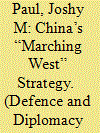

|
|
|
| 2 |
ID:
170613
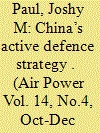

|
|
|
| 3 |
ID:
179449


|
|
|
| 4 |
ID:
176414
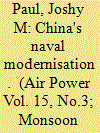

|
|
|
| 5 |
ID:
182106


|
|
|
| 6 |
ID:
134107
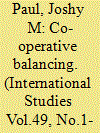

|
|
|
|
|
| Publication |
2014.
|
| Summary/Abstract |
The Asia-Pacific region is facing the threat of a number of potential military conflicts. Unresolved security challenges include the Sino-Japanese and Sino-Indian territorial disputes. The current peace and stability in the region has been achieved through various multilateral mechanisms and constant US involvement in the regional affairs. However, the declining US presence in Asia, the ineffectiveness of different multilateral institutions to establish a security order in the region and China's possible emergence as a great power in Asia may lead to the end of the status quo. In this context, it is pertinent that Asia should be free from both hegemony and power rivalry, and for that, 'co-operative balancing' is the best possible mechanism to achieve a long-term peace and stability. Co-operative balancing is a combination of power balancing and a co-operative security framework. It promotes the independent position of individual countries and strengthens the multilateral mechanisms. This essay concludes that India and Japan can balance against China while bilateral engagement among the three countries tends to reduce their distrust vis-à-vis China.
|
|
|
|
|
|
|
|
|
|
|
|
|
|
|
|
| 7 |
ID:
106758


|
|
|
| 8 |
ID:
084882
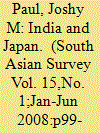

|
|
|
|
|
| Publication |
2008.
|
| Summary/Abstract |
The relationship between Japan and India has been influenced by the international power configuration over time. In the early post-War period, both countries embraced idealistic moor-ings about how the world should be. In due course of time, the United States (US) alliance system put Japan in the western camp of Cold War power politics while India followed a policy of non-alignment. However, with the end of the Cold War and the transformation of Asia into a composite power playground, India and Japan have developed a much closer relationship. The relative decline of America's strategic interest towards the East Asian region and the changing dynamics of security in Asia have forced Japan to search for new partners in Asia, culminat-ing in the present strategic partnership with India. It is in this context that this article probes Indo-Japanese relations by analysing their economic, political and strategic facets.
|
|
|
|
|
|
|
|
|
|
|
|
|
|
|
|
| 9 |
ID:
185869


|
|
|
| 10 |
ID:
102858
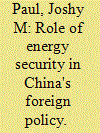

|
|
|
|
|
| Publication |
2010.
|
| Summary/Abstract |
Energy, particularly oil and gas, has become a strategic component of China's foreign and security policy in recent times. Beijing's search for resources for its economic success has created a notion of "scramble for energy" that portrays China's increasing activity in the energy sector worldwide through investment and equity stake considered as a political strategy by the Chinese elites. In this energy hunt foreign policy option, China faces increasing security problems as its energy passes through the Malacca Strait and also the Indian Ocean region. As a result China pays significant attention to secure the sea-lanes of communication and for that Beijing applies a combination of diplomatic and military mechanisms in its overall foreign policy arena. In this scenario, its energy security could lead to some kind friction with other countries of the Indian Ocean littoral area, including India. In this regard this work attempts to analyse different aspects of China's energy security policy and its implication for India.
|
|
|
|
|
|
|
|
|
|
|
|
|
|
|
|
| 11 |
ID:
082773


|
|
|